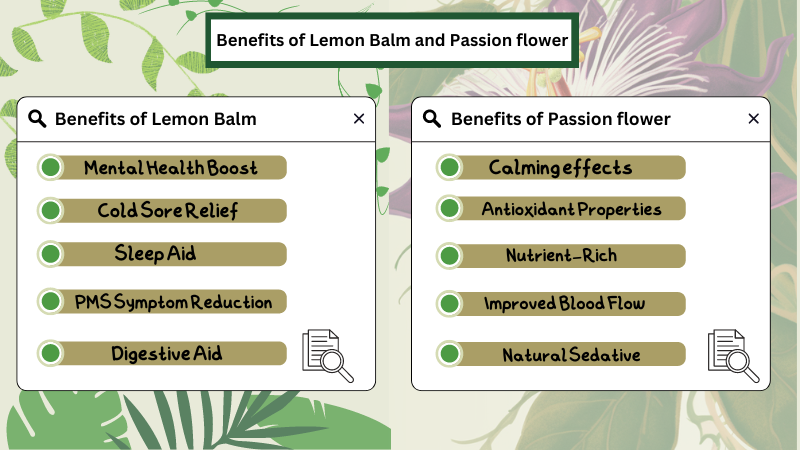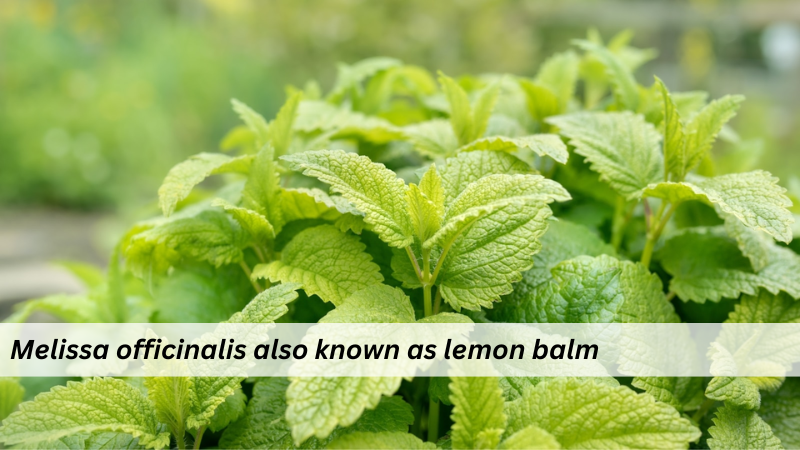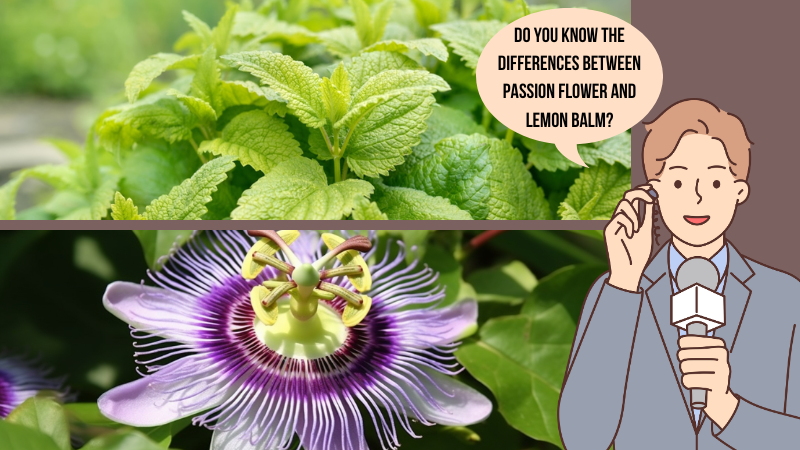In the vast realm of natural remedies, herbs have long held a revered place for their healing properties. Today we will explore Passion Flower vs Lemon Balm and consider which of these two stands out as the best potent alleviator of anxiety.
As more individuals seek holistic approaches to mental well-being, the question arises: Which of these two is the superior choice? Let’s delve into this query, as we weigh up the unique benefits each herb offers in the quest for tranquillity.
Table of Contents
Passion Flower vs Lemon Balm; What are their benefits?
While lemon balm is often touted for its mood-enhancing and cognitive-boosting effects, passionflower is celebrated for its potential to alleviate anxiety and promote restful sleep. Understanding the unique advantages of each can help individuals choose the best herbal remedy for their needs.
Gut Health Benefits of Passion Flower
Passionflower is a plant that is native to the southeastern parts of the Americas. It is also known by its scientific name, Passiflora incarnata. Passionflower has been used traditionally by Native Americans in the United States as a sedative and for treating wounds, boils, and earaches. The plant was later introduced to Europe and became popular as a calming herb. 1
- Calming Effects
- Antioxidant Properties
- Passion fruit, the delicious natural treat that is related to passionflower, is rich in antioxidants. These compounds play a crucial role in neutralising harmful free radicals in the body, thereby supporting overall health.
- Nutrient-Rich
- The fruit derived from the passionflower vine is packed with essential nutrients. It boasts high levels of vitamin A, which is crucial for skin, vision, and immune function, and vitamin C, a potent antioxidant. Additionally, passionflower is a great source of essential minerals such as magnesium, potassium, and calcium.
- Improved Blood Flow
- The antioxidants present in passion fruit have been recognised for their ability to enhance blood flow, especially benefiting the brain and nervous system.
- Natural Sedative
- Due to its potential sedative properties, passionflower can be a natural alternative for those seeking to improve sleep quality or reduce symptoms of anxiety.
Incorporating passionflower into one’s routine, whether as a tea, an extract, or in its fruit form, can offer a myriad of benefits, making it a valuable addition to a holistic approach to well-being.
We have also crafted a more insightful and informative article about what is passionflower tea good for to let you give insights and comprehensive guide about this herbal remedy.
Gut Health Benefits of Lemon Balm
Let’s switch gears in the passion flower vs lemon balm discussion and take a closer look at lemon balm.
Lemon balm is a herb belonging to the mint family and has been revered for centuries for its diverse medicinal properties.
Native to regions like Iran, Europe, and Central Asia, this plant offers a plethora of benefits that cater to both the mind and body. Here are some of its notable health benefits:
- Mental Health Boost
- Cold Sore Relief
- Sleep Aid
- PMS Symptom Reduction
- Digestive Aid

Incorporating lemon balm into one’s daily routine, whether through teas, supplements, or topical applications, can offer these benefits and contribute to overall well-being. However, as with any herbal remedy, it’s essential to consult with healthcare professionals before starting its use.
Leman Balm in Science the Researcher’s Take
Lemon balm, scientifically known as Melissa officinalis, is a perennial herb member of the mint family. Originating from Southern Europe, it has since naturalised across the globe, from the sandy soils of North America to the damp field and empty lots of New Zealand. But beyond its humble appearance and aromatic allure, the science behind lemon balm reveals a treasure trove of therapeutic properties.
Rich in a symphony of flavonoids, polyphenolic compounds, and essential oils like citral, this herb has been historically revered for its sedative, anti-gas, fever-reducing, and antibacterial effects, among others. 6
Modern research further underscores its potential in treating ailments ranging from headaches and insomnia to depression and hysteria. 6
Interestingly, while lemon balm has been a staple in traditional remedies for centuries, it’s only recently that the scientific community has begun to delve deep into its chemical compositions and therapeutic benefits.
As the world leans more towards natural remedies, the story of lemon balm serves as a testament to nature’s enduring pharmacy, reminding us that sometimes, the most potent cures can be found in our very own backyards.
Considering Further Science How To Use Passion Flower vs Lemon Balm
In the vast tapestry of herbal remedies, when we consider passion flower vs lemon balm, they emerge as two time-honoured botanicals, celebrated for their calming and therapeutic properties. Nestled in the heart of ancient medicinal practices, these herbs have whispered their secrets to healers and herbalists for centuries.
As the sun sets, imagine an elder in a quaint village, brewing a pot of passionflower tea for a restless child, while in another home, the soothing aroma of lemon balm wafts through the air, promising a night of serene slumber. These plants, with their rich histories, continue to weave stories of comfort and healing in modern times, bridging the gap between age-old traditions and contemporary wellness.

Here are the uses of passionflower and lemon balm that you need to know about.
Passionflower
- Tea
- Dried passionflower leaves and stems can be steeped in hot water to make a calming tea. Typically, one teaspoon of dried herb is used for one cup of water. Let your brew steep for around 10 minutes before you sip away.
- Tinctures
- Passionflower can be found in liquid extract form. The recommended dosage often varies, but generally, a few drops to a dropper full can be taken directly or added to water or juice.
- Capsules
- Passionflower is available in capsule form, which can be taken as a supplement. It’s essential to follow the recommended dosage on the label or as prescribed by a healthcare professional.
- Topical
- Some creams and ointments contain passionflower extract, especially for conditions like burns or inflammation.
Lemon Balm
- Tea
- Lemon balm leaves can be used to make a delightful tea regardless of whether they are fresh or dried. Add a handful of fresh leaves or 1-2 teaspoons of dried leaves to a cup of boiling water, steep for about 5-10 minutes, then strain and drink. This tea is known for its calming effects and can be consumed several times a day.
- Essential Oil
- Lemon balm is a go-to oil for Aromatherapists. It can be diffused or diluted with carrier oil and applied topically. However, it’s essential to ensure it’s appropriately diluted to avoid skin irritation.
- Tinctures
- Like passionflower, lemon balm is also available in tincture form. The dosage typically depends on the concentration, but a common recommendation is a dropper full taken 1-3 times daily.
- Creams and Ointments
- Lemon balm is often included in topical preparations, especially those designed to treat cold sores or other skin conditions.
- Capsules
- For those who prefer a more convenient form, lemon balm supplements in capsule form are available. As always, it’s crucial to adhere to the recommended dosage.
Five benefits of Lemon Balm
An important note: for both herbs, it’s essential to consult with a healthcare professional before starting any new herbal remedy, especially if you’re pregnant, nursing, or taking other medications. This ensures safe and effective use for your specific circumstances. None of the information or common recommendations provided here are directional in nature and are for illustrative purposes only. 8

Passion Flower and Lemon Balm: Herbal Treatment for Anxiety Reviews
Let’s take a quick look at some of the anecdotal accounts on our passion flower vs lemon balm discussion for some ‘lived experience’ human context.
Lemon Balm Treatment of Anxiety Reviews
Studies show that by elevating mood and reducing levels of stress hormones, lemon balm may help in reducing anxiety symptoms Additionally, lemon balm has been shown to improve cognitive function and reduce feelings of stress and tension. 9
Lemon balm has garnered a reputation for its calming effects, as evidenced by numerous personal testimonials. WebMD provides insights shared by others and includes one where a young adult found solace in the herb for severe anxiety, noting its rapid calming effects and potential benefits for depression. 10
Another individual, working in a high-stress job, found lemon balm to be a saviour in anxiety-inducing social situations, especially when dealing with intimidating clients.
Another person described their experience after using lemon balm for three months, where they observed a significant change in reactions to daily challenges, feeling less paranoid, and more in control.
Several others have found lemon balm to be particularly effective for hyperthyroid symptoms, such as anxiety and palpitations. However, as with any supplements or herbs, individual experiences can vary. For instance, caution is required as a result of its sedative effects and the potential to cause diarrhea.
Despite the varied experiences, the overarching sentiment is that lemon balm offers a natural way to alleviate anxiety and promote relaxation.
Passionflower Treatment of Anxiety Reviews
Passionflower has been hailed as a natural remedy for anxiety and insomnia, with numerous individuals attesting to its efficacy.
Turning to WebMD again, you will find accounts that describe it as being the best anxiety treatment some people have encountered, with some saying they were ‘amazed at its rapid calming effect. 11
It is worth noting that the benefits of passionflower aren’t limited to a specific age group; both young and old recount experiences where they found solace in its calming properties.
Many users laude its ability to alleviate panic attacks and improve sleep quality, and even deem it the best supplement they’ve ever tried after using it for fatigue and insomnia for seven months.
These anecdotal testimonials highlight the potential of passionflower, especially as a tea, in addressing mental health issues, emphasising the power and promise of natural remedies.
Research Findings and Combination of Lemon Balm and Passionflower
Studies analysing anonymised medical records from 3,252 psychiatric in-house patients over 3.5 years, the research aimed to determine if introducing a fixed combination of valerian, passion flower, lemon balm, and butterbur extracts or a product known as Ze 185 would alter benzodiazepine prescription habits. 12
The findings indicated that the group treated with Ze 185, which contains lemon balm and passionflower among other herbs, experienced a significant reduction in benzodiazepine prescriptions.
This suggests that the herbal combination might serve as a potential alternative to benzodiazepines, especially given the concerns about the long-term use of benzodiazepines and their associated adverse effects.
The study underscores the need for further controlled clinical trials to validate these findings and ensure the safety of the herbal combination.
FAQs
Can you take Lemon Balm and Passionflower together?
Yes, in our passion flower vs lemon balm discussion it is worth noting that lemon balm and passionflower can be taken together, and they are often combined in herbal supplements or teas formulated for relaxation, stress relief, or sleep support.
What are Passionflower and Lemon Balm good for?
Passionflower is good for reducing anxiety and promoting sleep. Lemon Balm helps calm nerves, improve mood, and can also aid sleep. Both are used for relaxation and stress relief.
Which is the most sedating herb between Passionflower and Lemon Balm?
Passionflower is generally considered to be more sedating. It is often used specifically for its sedative properties to help with insomnia and anxiety. However, individual responses can vary, and some people might find Lemon Balm to be quite calming as well.
Can I drink Lemon Balm Tea every day?
Yes, lemon balm tea can be consumed every day. You can brew 1.5 to 4.5 grams of leaves in 150 millilitres of hot water, and this can be taken several times a day. The leaves are also edible but it is suggested by Speacliaists that you do not exceed 10 grams a day. However, it’s important to check supplement formulations with your doctor to ensure the dosages are suitable and convenient for you.
Conclusion
In the quest for natural remedies to combat anxiety, both Passionflower and Lemon Balm have emerged as frontrunners. Passionflower, with its deep-rooted history in traditional medicine, has been lauded for its sedative properties and ability to alleviate symptoms of anxiety and insomnia. 2
On the other hand, Lemon Balm, a member of the mint family, not only offers calming effects but also boasts cognitive-enhancing benefits. 4
While both herbs have their unique strengths, the choice between them often boils down to individual preferences and specific needs. Some may find solace in the gentle embrace of Passionflower, while others might resonate more with the multifaceted benefits of Lemon Balm.
Ultimately, as with all natural remedies, it’s essential to consult with healthcare professionals and consider personal experiences when determining the best fit. The journey through the world of herbal remedies is deeply personal, and both Passionflower and Lemon Balm stand as a testament to nature’s profound ability to heal and soothe our bodies.
Join us in the passion flower vs lemon balm discussion on Pinterest and Instagram and let us know about your experiences!
References
- “Purported Benefits, Side Effects & More” – MSKCC Staff, Last checked 23 August 2023 [Memorial Sloan Kettering Cancer Center] [Archive] ↩︎
- “The Calming Effects of Passionflower” – Z. Ashpari, Last checked 22 August 2023 [HealthLine] [Archive] ↩︎
- “What are the health benefits of passion flower?” – N. Galan, Last checked 22 August 2023 [Medical News Today] [Archive] ↩︎
- “Lemon Balm” – K. Patel, Last checked 22 August 2023 [Examine] [Archive] ↩︎
- “Health Benefits of Lemon Balm” – W. Wisner, 4 June 2023 [Health] [Archive] ↩︎
- “Anti-Stress Effects of Lemon Balm-Containing Foods” – A. Scholey, A. Gibbs, C. Neale, N. Perry, A. Ossoukhova, V. Bilog, M. Kras, C. Scholz, M. Sass, S. Buchwald-Werner, 30 October 2014 [PubMed] [Archive] ↩︎
- “Anti-Stress Effects of Lemon Balm-Containing Foods” – A. Scholey, A. Gibbs, C. Neale, N. Perry, A. Ossoukhova, V. Bilog, M. Kras, C. Scholz, M. Sass, S. Buchwald-Werner, 30 October 2014 [PubMed] [Archive] ↩︎
- “Melissa officinalis L: A Review Study With an Antioxidant Prospective” – S. Miraj, R. Kopaei, S. Kiani, 11 September 2016 [PubMed] [Archive] ↩︎
- “Drop the Balm: How Lemon Balm Can Be Used to Quell Anxiety” – S. Brick, Last checked 22 August 2023 [Greatist] [Archive] ↩︎
- “User Reviews for Lemon Balm” – Web MD Staff, Last checked 22 August 2023 [Web MD Reviews] [Archive] ↩︎
- “User Reviews For Passionflower” – Web MD Staff, Last checked 4 August 2023 [WebMD] [Archive] ↩︎
- “Effect of the fixed combination of valerian, lemon balm, passionflower, and butterbur extracts (Ze 185) on the prescription pattern of benzodiazepines in hospitalized psychiatric patients—A retrospective case‐control investigation” – M. E. Keck, S. Nicolussi, K. Spura, C. Blohm, C. Zahner, J. Drewe, 27 January 2020 [PubMed] [Archive] ↩︎
Last Updated on 6 months by D&C Editorial Team


